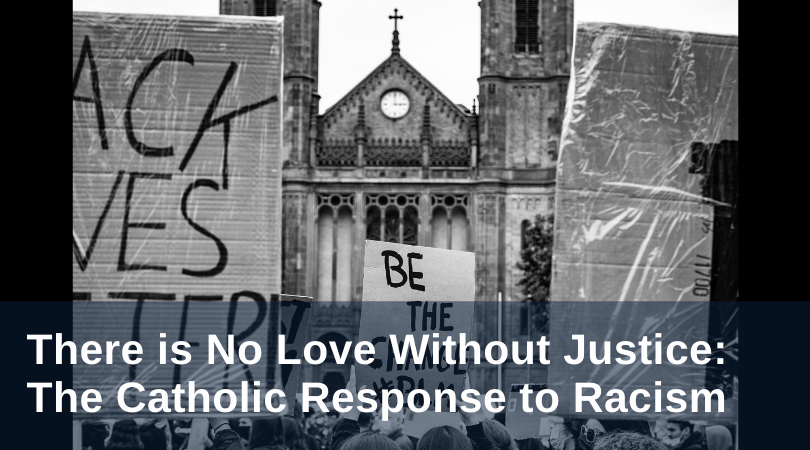
It seems trivial to say that we are living in strange times. Yet, the triviality does not change the reality. Structures, institutions, and patterns of life once thought permanent and stable have been radically altered by the pandemic; moreover, we have been made aware that the “normal” life so many of us desire to return to is one of pervasive discrimination and tragic injustice for many, especially our Black brothers and sisters. The murders of George Floyd, Breonna Taylor, Ahmaud Arbery, and others cry out for justice and call us to action.
We are struggling against two diseases: a physical disease and a “social and spiritual disease.” Both contagions spread pervasively and invisibly, both affect society as a whole as well as individuals, and both require shared responsibility and cooperation to bring healing.
As an older Millennial, I confess to sharing in the widespread disillusionment at the lack of full-throated condemnation of racism from many who purport to be leaders of parishes, organizations, and communities. The pulpit, printed page, and social media have become platforms for the abdication of moral authority by a generation of leaders who have dissipated that authority through silence, equivocation, the bad faith of culpable ignorance, the endless deferral of “the one thing necessary,” and the indefatigable “…but abortion”—as if we could not speak passionately in defense of the unborn and also speak out against racial injustice. As if the Gospel did not require you and I to do both those things in order to do either well.
The moral turpitude around racism would be curious if it weren’t so harmful, particularly from Christians who are too content—as Dr. Martin Luther King, Jr. noted—to be a social thermometer rather than a spiritual thermostat, reflecting only the sensibilities of our neighborhoods and social classes rather than raising them to meet the demands of Christ. Resistance too long delayed is participation.
This moral lethargy in speaking against racism reveals our complicity in the dangerous idolatry of our great American experiment, in which the Cross is subverted by the political party: the Lord’s good servant, but the Party’s first. It is a perverted interpretation of the Gospel that discovers not Christ’s condemnation of sin and call to conversion, but merely the ratification of our own convictions.
As Catholics, we commit ourselves to the Christian faith expressed in Scripture and Tradition, and our faith is unequivocal: racism is a sin. There is no gray area here. “If anyone says, ‘I love God,’ and hates his brother, he is a liar; for he who does not love his brother whom he has seen, cannot love God whom he has not seen” (1 John 4:20). Racism is a rejection of the Gospel that places us at odds with God who created all of us equal in dignity and saved each of us by the Blood of his Son. Catholicism not only teaches that personal and structural racism is “incompatible with God’s design,” it also commands us to work for its eradication (see CCC §1935).
As individuals and as a community, our faith invites reflection and action. We must examine our conscience. Where have our words and deeds colluded with stereotypes or racial animus? Where are we guilty of failing to combat racism when we see it, hear it, or find it in ourselves? Where are our attitudes more influenced by our personal preferences or political commitments than by the Gospel? In response to our failures, we must “rend our hearts” (Joel 2:13), but we must act too.
The Gospel is simple and straightforward: we are neighbors. God has given us to one another, commanding us to serve the cause of justice. Pope St. John Paul II proclaimed this clearly: “Wherever people are . . . humiliated by poverty or injustice, and wherever a mockery is made of their rights, make it your task to serve them.” How?
Defending the dignity of all human life always means affirming the dignity of particular human lives when they are threatened. For example, people participating in the March for Life specifically advocate for the unborn. This moment, too, calls us to the specificity of love. We must discern ways to heal the sin and legacy of racism in our hearts and in our country. If we can say confidently that unborn lives matter, then, surely, we can—and must—also say that Black lives matter.
We cannot be good Christians if we are not willing to be good neighbors. There cannot be love where we lack justice. Let us recommit ourselves to seeking justice and responding in love. Let us pray for healing in our world and in our hearts, and then let us get to work.
Like what you read? Submit your email below to have our newest blogs delivered directly to your inbox each week.
Featured image by Folco Masi via Unsplash


